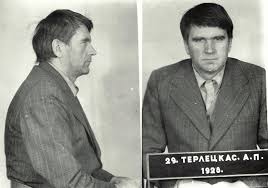The Case of Viktoras Petkus.
On 23 August 1977, the day of Viktoras Petkus’s arrest, a search was carried out at the home of Birute Pasiliene, who lives near Klaipeda (CCE 47.5), in addition to the searches reported in CCE 47.5. The warrant for the search, as for the other searches that day, was issued in connection with case No. 38, the case of Balys Gajauskas. It bore the official stamp of the Procurator of Lithuania, Kairelis, and of the Lithuanian KGB Chairman Petkevicius. The search lasted from 7 pm until 2 am.
The searchers found a resolution on the setting up of a Chief Committee of the National Movements of Estonia, Latvia and Lithuania dated 20 August 1977 (the same document that was found at Petkus’s home, CCE 47.5). Several copies were found, addressed to various people: Kurt Waldheim, leaders of Western countries, Brezhnev. Also confiscated was a typewriter (Lithuanian) and [Solzhenitsyn’s] The First Circle (typewritten in Russian). They wanted to take Pasiliene away for interrogation there and then, but she resisted because of the late hour. They questioned her the next day. She stated that she did not know whom the typewriter and documents belonged to, and also that the typewriter had nothing to do with Gajauskas’s case. The book by Solzhenitsyn had been given to her, she said, by K. Jokubinas (in May 1977 he emigrated to Canada, CCE 45.15).
On 21 and 22 December 1977, Birute Pasiliene was interrogated by the Vilnius KGB. Investigator Lazarevicius (CCE 32.// and CCE 47) showed her a report by a commission of experts according to which the documents of the Chief Committee had been typed out on the typewriter found at her home. Pasiliene reiterated that she did not know how the documents of the Chief Committee had come to be in her home or who had typed them on the typewriter.
In reply to the investigator’s questioning, she said that she was not acquainted with V. Petkus. Lazarevicius said that in connection with the Petkus case her application to emigrate from the USSR would be shelved and another matter would be decided — whether or not to arrest her.
*
On 18, 19 and 20 January 1978, Mart Niklus (CCEs 42, 43, 47) was interrogated in Vilnius, after being summoned from Tartu. Following each question Niklus refused to reply and handed the investigator the reason for his refusal, written in Estonian (there was an interpreter at the interrogation) with a copy; afterwards he took the copies away with him. When they confronted Niklus with Kalnins’s testimony he declared that it had no legal force in view of the latter’s chronic alcoholism.
Two more Estonians, Enn Tarto (CCE 2 and CCE 47) and Erik Udam (CCE 46 and CCE 47) were questioned on 20 February. They also refused to reply.
*
At the end of February 1978, Antanas Terleckas (CCE 47.5) was again summoned for interrogation. He refused to answer all questions. They asked him about the Chief Committee of the National Movements, the Lithuanian Helsinki Group, his personal relations with Petkus and their trip together to Latvia in the summer of 1976: Kalnins had testified that Terleckas and Petkus had come to Riga to take part in a seminar on the ethnography of the Baltic States, held in the flat of Inc Calitis (CCE 47.5).
Antanas Terlackas, b. 1928
*
The Chronicle of the Lithuanian Catholic Church, issue 31, reports on the circumstances surrounding the interrogation of Fr. Karolis Garuckas on 10 October 1977 (CCE 47.5).
On 7 October 1977, a man knocked at the door of the priest’s home in the village of Ceikiniai. When they let him in, he asked if the house-owner Garuckas recognized him. The uninvited guest behaved provocatively: he rummaged through papers, read letters addressed to Garuckas, and, noticing a typewriter, inquired: ‘What, are you writing a Chronicle?” Seeing a letter and photograph of a soldier, he asked: “Investigating the army, are you? Who’s that letter from? Who’s that photograph of?” Discovering a portrait of Pope Paul VI on the wall, he said maliciously: “All of you hate the Soviet Union!” Garuckas asked the guest if he intended to carry out a search and received a summons to appear on 10 October for interrogation at the Vilnius KGB.
In Vilnius Investigator Lazarevicius questioned Garuckas quite courteously, explaining that testimony had already been taken from Ona Lukauskaite-Poskiene and Eitan Finkelstein, and only the respected Karolis Garuckas had still not been interrogated. What interested the investigator was how and when Garuckas had become a member of the Lithuanian Helsinki Group, where and when he had become acquainted with Tomas Venclova and Petkus, how the Group communicated with Moscow dissidents, how often there were Group meetings, and so forth.
It was only several days later that Garuckas remembered the man who had visited him on 7 October. He was Paskevicius, the Chief of the Ignalina district KGB.
*
On 28 February Sergei Soldatov, who is in Mordovian Camp 19, was interrogated. An investigator of the Mordovian KGB, who conducted the interrogation on the instructions of the Lithuanian KGB, announced to him that he was being questioned “in connection with the case of the Chief Committee of the National Movements of Estonia, Latvia and Lithuania”.
Soldatov was asked about the following people: Gajauskas, Pasiliene, Krilis (?), Ziemelis (CCE 47.5), Petkus, Calitis, Kalnins, Niklus and Udam. He refused to answer questions.
